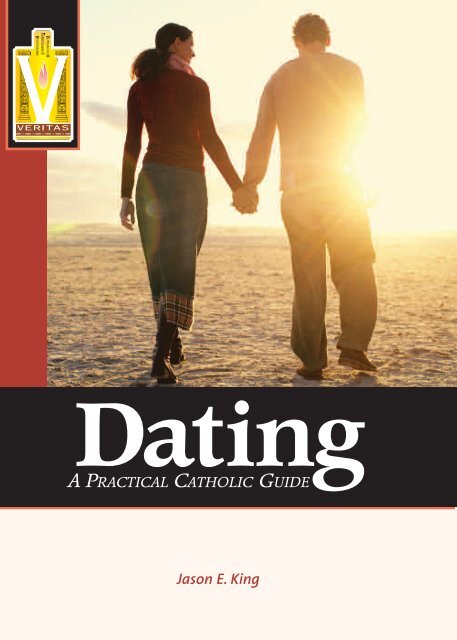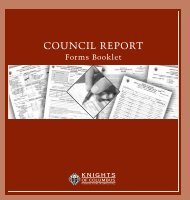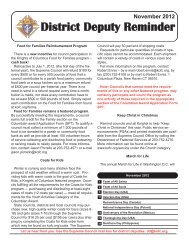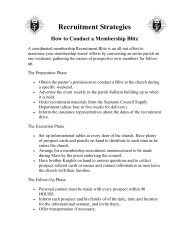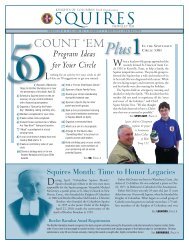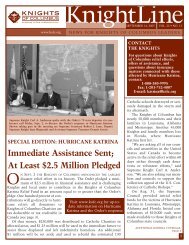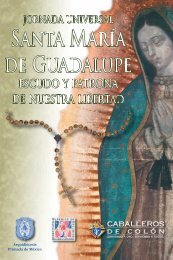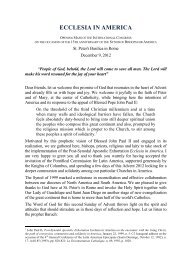Dating - Knights of Columbus, Supreme Council
Dating - Knights of Columbus, Supreme Council
Dating - Knights of Columbus, Supreme Council
Create successful ePaper yourself
Turn your PDF publications into a flip-book with our unique Google optimized e-Paper software.
VVERITAS<br />
<strong>Dating</strong><br />
APRACTICAL CATHOLIC GUIDE<br />
Jason E. King
The <strong>Knights</strong> <strong>of</strong> <strong>Columbus</strong> presents<br />
The Veritas Series<br />
“Proclaiming the Faith in the Third Millennium”<br />
<strong>Dating</strong><br />
A Practical Catholic Guide<br />
by<br />
Jason E. King<br />
Editor<br />
Damian Lenshek<br />
Catholic Information Service<br />
<strong>Knights</strong> <strong>of</strong> <strong>Columbus</strong> <strong>Supreme</strong> <strong>Council</strong>
© 2007 by <strong>Knights</strong> <strong>of</strong> <strong>Columbus</strong> <strong>Supreme</strong> <strong>Council</strong>. All rights reserved.<br />
Cover: Couple holding hands in sunbeams. Royalty Free © image100/Corbis.<br />
No part <strong>of</strong> this book may be reproduced or transmitted in any form or by any<br />
means, electronic or mechanical, including photocopying, recording, or by<br />
information storage and retrieval system, without permission in writing from<br />
the publisher. Write:<br />
Catholic Information Service<br />
<strong>Knights</strong> <strong>of</strong> <strong>Columbus</strong> <strong>Supreme</strong> <strong>Council</strong><br />
PO Box 1971<br />
New Haven, CT 06521-1971<br />
www.k<strong>of</strong>c.org/cis<br />
cis@k<strong>of</strong>c.org<br />
203-752-4267<br />
203-752-4018 fax<br />
Printed in the United States <strong>of</strong> America
CONTENTS<br />
Introduction................................................................................5<br />
A Brief History <strong>of</strong> <strong>Dating</strong>...........................................................6<br />
What is <strong>Dating</strong>? .........................................................................8<br />
Various Views <strong>of</strong> <strong>Dating</strong> ...........................................................10<br />
Which one is the Catholic Understanding <strong>of</strong> <strong>Dating</strong>?..............13<br />
A Catholic Understanding <strong>of</strong> <strong>Dating</strong>........................................14<br />
Implications <strong>of</strong> the Catholic Approach......................................25<br />
Endnotes ...................................................................................31<br />
For Further Reading .................................................................33<br />
About the Author .....................................................................34
IntroductIon<br />
<strong>Dating</strong> is a relatively recent phenomenon. Throughout most <strong>of</strong><br />
history, marriages were negotiated by families, usually for<br />
economic or political reasons. In most parts <strong>of</strong> the world, this<br />
approach is still the norm. Romantic relationships outside <strong>of</strong><br />
marriage were thought to result from an impractical attraction, a<br />
corruption <strong>of</strong> virtue, or even a mental disorder.<br />
<strong>Dating</strong> as we stereotypically think <strong>of</strong> it only emerged in the late<br />
1920’s and then primarily in the United States and parts <strong>of</strong><br />
Europe. While sociologists and psychologists have studied the<br />
phenomenon, theologians have rarely touched upon the topic.<br />
Ignoring dating, however, is a serious mistake. By the age <strong>of</strong><br />
sixteen, 78% <strong>of</strong> girls and 83% <strong>of</strong> boys have been on a date. With<br />
the average age <strong>of</strong> marriage being roughly thirty for college<br />
graduates and just a little younger for others, most people in the<br />
United States are doing something more than friendship and less<br />
than marriage for upwards <strong>of</strong> fifteen years <strong>of</strong> their lives. Aristotle<br />
believed that after the age <strong>of</strong> seven people were formed in their<br />
habits and could not change. In the United States today, people<br />
spend twice this amount <strong>of</strong> time forming themselves in habits <strong>of</strong><br />
relating to one another, habits that will affect their behavior for<br />
the rest <strong>of</strong> their lives, for good or for ill.<br />
Since Christianity is at heart about relationships—the two<br />
greatest commandments are about how to relate to God and<br />
relate to others—Christians cannot dismiss dating. Even if<br />
dating turns out to be a fleeting moment in cultural history, it<br />
still affects countless individuals today. Not reflecting on dating<br />
is akin to abandoning all <strong>of</strong> these people, giving them no<br />
guidance, no opportunities for reflection, and no support from<br />
-5-
the community. It leaves them little to no help in forming<br />
relationships that are truly loving and relating these relationships<br />
to their Catholic faith.<br />
This booklet is an attempt to bring the riches <strong>of</strong> the Catholic<br />
tradition to bear on dating. It explores how beliefs in God, the<br />
Trinity, and the life, death, and resurrection <strong>of</strong> Jesus provide a<br />
way to think about dating and suggest ways in which it should<br />
be practiced.<br />
A BrIef HIstory <strong>of</strong> dAtIng 1<br />
In the very early 1900’s, men and women familiarized themselves<br />
with each other through “calling.” If a man was interested in a<br />
woman, he would come to “call” at her house. He would<br />
introduce himself to her parents but not to the woman herself.<br />
The parents then took the name <strong>of</strong> the man (if they approved) to<br />
the woman, and then the woman decided if she wanted to meet<br />
the visitor or not. A woman could have several men “calling” on<br />
her, as “calling” was not a formal relationship and usually<br />
entailed conversing with the man in the woman’s home under<br />
supervision. If a woman repeatedly declined to meet the caller,<br />
the man would realize that he should stop visiting. If a woman<br />
decided to only accept one “caller” and no others, the relationship<br />
had moved to a different level. The couple still met in the home<br />
under supervision, but the two were considered to be “keeping<br />
company.” As the woman was supposed to “keep company” with<br />
only one man, the relationship was considered to be more formal,<br />
more serious, and progressing toward marriage.<br />
This approach included family, took place in the home, focused<br />
on conversation, and placed decision making in the hands <strong>of</strong> the<br />
woman. These features changed in the late 1920’s and early<br />
-6-
1930’s primarily because <strong>of</strong> the automobile. This is when dating<br />
as we stereotypically think about it began. A male would pick up<br />
the female from her house and take her to the movies, skating,<br />
dancing or whatever it was that they had agreed to do.<br />
This new approach resulted in a number <strong>of</strong> changes in how these<br />
romantic relationships unfolded. Instead <strong>of</strong> the relationship<br />
taking place in the woman’s home with support from the<br />
woman’s family, dates now took place in the man’s car and with<br />
the man’s money. The former power <strong>of</strong> women was replaced by<br />
the newfound power <strong>of</strong> men. Also, being separated from family<br />
and home, the lure <strong>of</strong> sex and sexual activity on dates began to<br />
grow.<br />
Despite these shifts, dating was still a formal practice. Times and<br />
days for dates were planned ahead. Parents and peers thus knew<br />
about the dating, and, should something happen on the date,<br />
people knew who was involved. Social cues to indicate what was<br />
acceptable and what was not acceptable were still in play. Going<br />
on dates was thought to be a precursor to “going steady” and thus<br />
a preparation for marriage.<br />
This approach to dating shifted in the 1960’s and the 1970’s with<br />
emergence <strong>of</strong> contraceptives and the sexual revolution. The formality<br />
<strong>of</strong> going on dates tended to be replaced by informal relationship,<br />
cohabitation, and sexual encounters. <strong>Dating</strong> was referred to as seeing<br />
someone, hanging out with someone, or hooking up with someone.<br />
People began to marry later, so the connection between dating and<br />
marriage became tenuous at best.<br />
In today’s world, dating is usually understood in one <strong>of</strong> three<br />
ways. A man and woman might get together one night or a series<br />
<strong>of</strong> nights for sexual activity—ranging anywhere from kissing to<br />
-7-
intercourse—without a serious commitment. Or, a man and<br />
woman might enter into a highly committed relationship, eating<br />
almost every meal together and frequently spending nights at<br />
each other’s place. Finally, a man and a woman might go out with<br />
a group, talking primarily with each other, but not excluding the<br />
other members <strong>of</strong> the group. This group could be friends, other<br />
couples, or even families. <strong>Dating</strong> may or may not include sex, it<br />
could be serious or not, it might be public or private, and it may<br />
or may not have any connection to marriage. Given this diversity,<br />
it is no wonder that one <strong>of</strong> the challenges facing men and women<br />
today is how they communicate their understanding <strong>of</strong> dating<br />
and what it entails.<br />
WHAt Is dAtIng?<br />
Given these various manifestations <strong>of</strong> dating, it is difficult to<br />
arrive at a clear understanding <strong>of</strong> what dating is, much less to<br />
evaluate it. If we are to arrive at a Catholic understanding <strong>of</strong><br />
dating, however, we must explain what we are talking about<br />
when we consider the subject. To cover all <strong>of</strong> these various types<br />
<strong>of</strong> dating, I am going to define dating not by what it is, but by<br />
what it is not.<br />
<strong>Dating</strong> is not marriage. This statement is obvious but needs to be<br />
made since there are similarities between the two types <strong>of</strong><br />
relationships. Both are about the relationship between a man and<br />
woman, and both involve romantic love and sexual attraction.<br />
While marriage is entered into with the expectation that it will<br />
last until death, dating is entered into with the certainty that it<br />
will end. In dating, people either break up or get married. In<br />
either case, dating has ended.<br />
-8-
<strong>Dating</strong> is not friendship. Often dating and friendships overlap,<br />
and, from a Catholic perspective, they ought to overlap. But they<br />
are not the same kind <strong>of</strong> relationship. <strong>Dating</strong> involves what the<br />
ancient Greeks, and more recently Pope Benedict XVI, call eros. 2<br />
Eros is a concrete and specific love. It is a love for a particular<br />
person and his or her physical presence. It involves physical<br />
affection but is not what we call “erotic” in our culture.<br />
Friendship is a different kind <strong>of</strong> love, one that does not involve<br />
eros. In other words, if friends start kissing, they are something<br />
more than friends.<br />
<strong>Dating</strong> is not courtship. Historically, dating has been synonymous<br />
with courtship. Only relatively recently, since the 1970’s, did<br />
this really change. Still there is a difference – an important<br />
difference. In courting, the question <strong>of</strong> marriage is being actively<br />
entertained. The root <strong>of</strong> courtship is to court, to woo, to invite.<br />
Courtship is thus to invite the real possibility <strong>of</strong> marriage into<br />
the relationship. While dating rarely cuts <strong>of</strong>f the possibility <strong>of</strong><br />
marriage, the possibility is not a prominent feature. Usually in<br />
dating, people are just getting to know each other.<br />
While the separation between the two should not be drawn too<br />
sharply, there is an important value in making the distinction. If<br />
one collapses courtship and dating into one relationship, then<br />
marriage is considered before or while the couple is just getting<br />
to know each other. Rather, we should come to know each other<br />
before we think about getting married. Otherwise, we end up<br />
with situations <strong>of</strong> sixteen year olds trying to evaluate their<br />
relationship based on whether or not they would marry the<br />
person, or a twenty year old in college searching for a spouse<br />
instead <strong>of</strong> just talking to people.<br />
-9-
<strong>Dating</strong> is not sex. Sex is frequently associated with dating, but the<br />
two are not synonymous. Many people have dating relationships<br />
in which they do not have sex. Some people have sex with a<br />
person that they do not or will not date. This obvious distinction<br />
needs to be made, because when people condemn dating, they<br />
<strong>of</strong>ten are in fact condemning premarital sex. An opposition to the<br />
latter does not mean an opposition to the former. Catholicism<br />
stands against pre-marital sex but this is not a stand against<br />
dating. It is a stand against one type <strong>of</strong> activity <strong>of</strong>ten associated<br />
with dating. As long as this distinction is maintained, many <strong>of</strong><br />
the concerns people have about dating fall away.<br />
In excluding these understandings <strong>of</strong> dating, we have created a<br />
broad grasp <strong>of</strong> dating that encompasses the numerous types and<br />
experiences <strong>of</strong> dating. Knowing what dating is, though, does not<br />
tell us how Catholics think about it.<br />
VArIous VIeWs <strong>of</strong> dAtIng<br />
While dating has not been around long, it has existed long<br />
enough for people to think and form opinions about it. Let’s look<br />
at some <strong>of</strong> these opinions.<br />
<strong>Dating</strong> is wrong. While not a view held by many people, it is held<br />
by numerous critics <strong>of</strong> our culture as well as many Christians,<br />
Catholic and Protestant alike. It should be no surprise that the<br />
best selling book on Christianity and dating is titled Why I Kissed<br />
<strong>Dating</strong> Goodbye. 3 The concerns these people have about dating are<br />
multiple. Since dating relationships break up, they cause<br />
suffering and suffering should be avoided. Since they end, they<br />
are also a practice for divorce and train people to give up when<br />
relationships get difficult. <strong>Dating</strong>, even if it does not involve<br />
-10-
premarital sex, tempts one toward it. For these reasons, it is<br />
argued that dating is wrong.<br />
It might be easy to dismiss these individuals as curmudgeons,<br />
but they allude to a reality <strong>of</strong>ten glossed over in the more<br />
romantic notions <strong>of</strong> dating. Violence <strong>of</strong>ten accompanies dating.<br />
65% <strong>of</strong> people experience emotional, verbal, or physical violence<br />
in dating relationships. More than a third <strong>of</strong> dating relationships<br />
in college have incidences <strong>of</strong> nonsexual dating violence.<br />
This violence is overwhelmingly directed toward women, who<br />
make up 85% <strong>of</strong> the victims <strong>of</strong> dating violence. In colleges, 67%<br />
<strong>of</strong> all sexual assaults are cases <strong>of</strong> date rape, with 94% <strong>of</strong> the<br />
perpetrators being male. In fact, date rape is the most commonly<br />
reported crime on college campuses. Rape is more common at<br />
private colleges and major universities than in society at large.<br />
(Institutions with a religious affiliation, however, have rates<br />
lower than the national average.) 4<br />
Such violence deserves the strongest condemnation, and the<br />
Catholic Church provides a the foundation necessary to<br />
completely reject this destructive behavior. Given Catholicism’s<br />
devotion to the Blessed Mother, its upholding <strong>of</strong> the dignity and<br />
vocation <strong>of</strong> women, 5 its insistence on the procreative and unitive<br />
value <strong>of</strong> sex, 6 and its uncompromising pro-life stance that abhors<br />
violence directed at other people, the troubling reality that these<br />
rape and violence statistics suggest is obviously incompatible<br />
with the practice <strong>of</strong> the Faith.<br />
<strong>Dating</strong> is wonderful. This understanding <strong>of</strong> dating is more<br />
widespread and common. It is the one most people have when<br />
entering into relationships and is the one most <strong>of</strong>ten portrayed in<br />
books, television shows and movies. Like the understanding <strong>of</strong><br />
-11-
dating we just looked at, this one also has a basis in reality. The<br />
joy and excitement <strong>of</strong> a new relationship are overwhelming at<br />
times. We learn about another person, experience new things,<br />
and visit new places. The world itself seems magical and<br />
delightful.<br />
This experience is so joyful and pr<strong>of</strong>ound that Catholicism has<br />
historically used it to describe the relationship <strong>of</strong> God’s love for<br />
humanity. The Song <strong>of</strong> Songs, found in the Old Testament, is a<br />
long poem describing the pursuit <strong>of</strong> the beloved by the lover and<br />
the lover by the beloved. Catholics have traditionally understood<br />
this book as a metaphor for understanding God’s pursuit <strong>of</strong> us<br />
and our pursuit <strong>of</strong> God. The fun and happiness that we<br />
experience at the onset <strong>of</strong> a new relationship give us a glimpse <strong>of</strong><br />
what our life in God is destined to be like.<br />
While there are experiences that seem to justify condemning<br />
dating, there are also wonderful experiences that lead to a support<br />
for dating.<br />
<strong>Dating</strong> is advantageous. Unlike the other two views that work in<br />
categories <strong>of</strong> good and bad, right and wrong, this understanding<br />
sees dating as useful. <strong>Dating</strong>, in other words, is not necessarily<br />
good or bad but rather practical. If people choose to date, they<br />
can expect some benefit from doing so. Since almost 80% <strong>of</strong> the<br />
population does date at some point, it can be safely concluded<br />
that dating is an advantageous enterprise. If you are one <strong>of</strong> the<br />
20% not dating, the assumption is that you are missing out on<br />
something important.<br />
What is the advantage <strong>of</strong> dating? It can be like “test driving” a<br />
vehicle before you buy it or like buying a product with a money<br />
back guarantee. You can try it out, but you are not required to<br />
-12-
completely commit to it until later. <strong>Dating</strong> can also be useful to<br />
help find someone to marry or prevent you from being lonely.<br />
You can try out different kinds <strong>of</strong> relationships until you find the<br />
right one, the one that works for you. By dating, you can also<br />
learn how to relate to other people, how to interact with your<br />
peers <strong>of</strong> the opposite sex. <strong>Dating</strong> can even help you to become<br />
more popular, be recognized, or improve your social standing.<br />
Regardless <strong>of</strong> the end, dating can be useful in leading people to<br />
it. <strong>Dating</strong> can be fun and enjoyable in and <strong>of</strong> itself, but its real<br />
allure is its ability to lead you to something greater.<br />
<strong>Dating</strong> is trivial. Like the last category, this view <strong>of</strong> dating is not<br />
a moral evaluation but a practical one. Unlike the last<br />
understanding that held dating to be useful, dating in this view<br />
is the opposite. <strong>Dating</strong> is recreational. It is like a game or<br />
sporting event or party. It is fun while it lasts, but, after it is over,<br />
we go back to our normal life. <strong>Dating</strong> on this understanding is<br />
akin to “hanging out” or “hooking up.” It does not involve a<br />
substantive commitment nor does it seriously impact people’s<br />
lives. Culturally, we take this view when we think <strong>of</strong> dating as<br />
just a phase <strong>of</strong> life or a rite <strong>of</strong> passage. It is a hoop we jump<br />
through and nothing else. By all means enjoy it, but do not take<br />
it too seriously.<br />
WHIcH one Is tHe cAtHolIc understAndIng <strong>of</strong> dAtIng?<br />
The short and easy answer is that there is no one specifically<br />
Catholic understanding <strong>of</strong> dating. <strong>Dating</strong> is not mentioned in<br />
the Bible or in the Catechism <strong>of</strong> the Catholic Church. Neither the<br />
Church Fathers nor recent popes have talked about dating. The<br />
Church as the whole body <strong>of</strong> believers, spanning the globe and<br />
human history, tends to think about those issues that apply to<br />
-13-
most people over a long period <strong>of</strong> time. “The Church thinks in<br />
centuries,” the saying goes. Because <strong>of</strong> this concern for all people<br />
and all times, it is no wonder that the Church has not<br />
commented directly on a phenomenon that has been around for<br />
less than 100 years and affects less than 1/3 <strong>of</strong> the world’s current<br />
population.<br />
While the Church may not have an explicit teaching on dating,<br />
it has riches beyond belief about human relationships, especially<br />
romantic ones. Formulating a Catholic proposal about dating<br />
requires us to take the Church’s two thousand years <strong>of</strong> reflection<br />
and experience and apply it to our current context. If we do so,<br />
we can arrive not at the Catholic understanding <strong>of</strong> dating but at<br />
an understanding <strong>of</strong> dating that is both compatible with and<br />
nourishes our Catholic faith.<br />
The first insight gained from the Catholic tradition is that the<br />
four views <strong>of</strong> dating are all equivalent to “heresies.” In<br />
Catholicism, a heresy is <strong>of</strong>ten a half-truth. Heretics frequently<br />
take one part <strong>of</strong> the faith and exclude another part. Thus,<br />
Gnosticism was considered heretical because it insisted that Jesus<br />
was God but not human. Ebionism championed Jesus’ humanity<br />
while neglecting his divinity. Thus, the four perspectives on<br />
dating each affirm something true but also leave out some truth.<br />
A Catholic view <strong>of</strong> dating takes all <strong>of</strong> the positive insights <strong>of</strong> the<br />
four views while abandoning all <strong>of</strong> the shortcomings.<br />
A cAtHolIc understAndIng <strong>of</strong> dAtIng<br />
Building on the previous four views, a Catholic definition <strong>of</strong><br />
dating is: a joyful practice in Christian love that is incompatible<br />
with sin. Let me explain this definition by going in reverse order<br />
-14-
to draw out the good and avoid the bad <strong>of</strong> each <strong>of</strong> the four<br />
understandings <strong>of</strong> dating.<br />
<strong>Dating</strong> is joyful but not trivial. Viewing dating as trivial though<br />
wrong, serves to underscore a Catholic truth about relationships:<br />
they are intended to be joyful. We are not only made to love and<br />
be loved, but, in doing so, we experience peace, joy, and<br />
happiness. The examples in the Christian tradition <strong>of</strong> this truth<br />
abound. Moses reminded the Israelites that by following the<br />
commandments their lives would be blessed. Jesus described<br />
heaven as a wedding banquet. Saint Augustine said that our<br />
hearts are restless until they rest in God. Dante depicted heaven<br />
as a place <strong>of</strong> singing and dancing in communion with God and<br />
the saints, welcoming newcomers by singing, “Oh joy, another<br />
person to love.” Saint Thomas Aquinas said that heaven is where<br />
we find happiness as friends <strong>of</strong> God. Jesuit Father Bernard<br />
Lonergan said that religious conversion was like falling in love<br />
with God. Joy in our relationships with others, joy in our<br />
relationship with God, this is what God wants for us and for<br />
which he made us.<br />
In this sense, dating truly is re-creational. God is the creator <strong>of</strong><br />
the universe, establishing from the very beginning a relationship<br />
between himself and us. He enjoys it, saying it is good. We<br />
should then re-create this original joyful relationship in all <strong>of</strong> our<br />
relationships. Yet, only in this sense is dating recreational. After<br />
creation, God takes immediate interest in humans, attending to<br />
them, respecting them, chastising them, guiding them, basically<br />
treating them with a dignity and respect far beyond anything<br />
they deserve based on their behavior. Relationships are never<br />
trivial in God’s eyes. The first three commandments are about<br />
how to relate to God and the last seven are about how we are to<br />
-15-
elate to one another. Over and over again, the Bible talks about<br />
these two relationships and how they must not be neglected. So,<br />
trivializing any relationship is really a trivializing <strong>of</strong> God’s<br />
creation, God’s commandments, and God’s own concern for other<br />
people. While grasping the fun and pleasurable part <strong>of</strong> a<br />
relationship, the trivial view <strong>of</strong> dating misses its pr<strong>of</strong>ound<br />
importance.<br />
<strong>Dating</strong> is a practice but is not advantageous. The view <strong>of</strong> dating as<br />
advantageous indicated that dating was useful and thus led us to<br />
some other end. We usually think <strong>of</strong> marriage as this end. <strong>Dating</strong><br />
is thus useful because it helps us to test if this is the person whom<br />
we want to marry. There are other ends: to learn how to socialize,<br />
to become more popular, or to avoid loneliness. The truth found<br />
in this perspective is that dating does lead us somewhere. Where<br />
this perspective goes awry is in its understanding <strong>of</strong> the purpose<br />
<strong>of</strong> dating.<br />
Catholicism views relationships in general as good, not for just<br />
anything, but as practices in loving. “Practice” here has a specific<br />
meaning. Often we think <strong>of</strong> “practice” as leading to some<br />
external goal. We practice in order to win a game or in order to<br />
be the best performer at a recital. We practice to get the trophy<br />
or the prize. Yet, practice also helps us refine and perfect what we<br />
do. In this understanding, what happens at practice cannot be<br />
divided so easily from the game or recital. People who love a<br />
sport or instrument practice not to win awards but to excel at the<br />
particular activity. Their practice is doing the activity so that<br />
they can excel at it. Their end and joy is doing the activity well,<br />
not winning the awards. 7<br />
Relationships are practices in love in this second sense. They are<br />
practices not because we use other people in relationships to learn<br />
-16-
to love but because we love the other people in our relationships,<br />
we work to become excellent at loving. This is where the “dating<br />
is advantageous” perspective veers <strong>of</strong>f into error. Those who view<br />
dating this way <strong>of</strong>ten focus on the wrong end, <strong>of</strong>ten a self-serving<br />
one. <strong>Dating</strong> to become popular, increase social standing, or avoid<br />
loneliness are selfish reasons. You would be viewing other people<br />
as useful to yourself. They are important only to the degree that<br />
they can help you, and, as soon as they cannot, you leave them.<br />
Instead, Catholics view relationships as places where we hone our<br />
ability to love because we love those with whom we are in<br />
relationship. In his encyclical letter, Deus Caritas Est, Pope<br />
Benedict XVI says that eros—what we would call today romantic<br />
love—is a love that draws us out <strong>of</strong> ourselves, toward others, and,<br />
eventually, through the longing, on to God. Of course, eros can be<br />
corrupted in any number <strong>of</strong> ways. It can direct people toward<br />
pleasure instead <strong>of</strong> the person or it can cause a couple to focus on<br />
themselves and neglect those around them. If purified and<br />
properly understood, however, eros leads to the Christ-like love <strong>of</strong><br />
others that the early Christians called agape. 8 Hence, it should be<br />
no surprise that after Pope Benedict XVI discusses the unity <strong>of</strong><br />
love in the first half <strong>of</strong> his letter, he then discusses the “practice<br />
<strong>of</strong> love by the Church” in the second half.<br />
One purpose that “dating is advantageous” proposes that is closer<br />
to love, but still falls short, is the idea <strong>of</strong> “test driving.” <strong>Dating</strong><br />
is to try out another person and see if that person is compatible<br />
for marriage. While this argument sounds reasonable, it is<br />
problematic in at least two ways. First, it assumes a consumer<br />
mentality with regard to other people. <strong>Dating</strong> becomes shopping<br />
for a partner. Persons are viewed as things that we can “try” and<br />
“test.” Yet, as human beings, we cannot do this. People are not<br />
-17-
commodities that can be bought, sold, tested, and tried. What<br />
we do to people and how we relate to them affects us as much as<br />
them. If we treat another like a product, we do not see in that<br />
person the individual who is made in the likeness and image <strong>of</strong><br />
God, the person whom God’s only begotten Son came to save.<br />
Instead we see him or her as a thing to be treated as we see fit.<br />
People should go on dates but not to “test drive” people. Rather,<br />
we should go on dates to learn to love other people for who they<br />
are. If the relationship continues to grow in this love, the<br />
question <strong>of</strong> marriage should naturally arise.<br />
Second, there is no way to have a “test drive” or a “trial”<br />
marriage. Sacramental marriage is a promise, a vow exchanged<br />
between two people in the presence <strong>of</strong> the Church. There is no<br />
way to test making a vow. You make it or you do not. I am not<br />
saying that dating has no relationship to marriage, but that there<br />
are dimensions to marriage for which dating cannot prepare us.<br />
The Methodist theologian Stanley Hauerwas went so far as to say<br />
that, “We always marry the wrong person!” 9 His point is that<br />
even a couple perfectly related to each other before their<br />
marriage, the very act <strong>of</strong> getting married changes the person<br />
irrevocably. Hence the person you perfectly related to before the<br />
marriage is now different. Hauerwas’ thought should resonate<br />
with Catholics. We believe that the sacrament <strong>of</strong> marriage<br />
changes the couple: they receive God’s grace and enter into a<br />
bond that can only be broken by death. Thus, no matter how<br />
serious and extended the dating period is, it cannot simulate the<br />
irrevocable bond that binds a husband and wife.<br />
Nowhere is this inability to “test drive” a spouse more apparent<br />
than in cohabitation. Culturally, we assume that people who live<br />
together beforehand know more what marriage is like and thus<br />
-18-
are better prepared for entering marriage. If there is any way to<br />
truly prepare for marriage, would it not be living as if you were<br />
married? The reality is that while dating may be done in a way<br />
that helps prepare for marriage, the same is never true <strong>of</strong><br />
cohabitation. If a cohabitating couple actually gets married<br />
(which is only a 50% chance), then their divorce rate is 75%, one<br />
and a half times the already staggering divorce rate <strong>of</strong> our<br />
culture.<br />
Statistically, the factors that best predict successful marriage are<br />
high education levels, not being teenagers or single parents, and<br />
having common values, background, and goals. 10 Neither length<br />
<strong>of</strong> dating prior to marriage nor number <strong>of</strong> people dated are good<br />
predictors <strong>of</strong> successful marriages. What is the relationship <strong>of</strong><br />
dating and marriage then? <strong>Dating</strong> helps us to learn about another<br />
person and care about him or her. It is a practice in how to love<br />
another person. Linking dating too close to marriage though, as<br />
if marriage is the exclusive end <strong>of</strong> dating, neglects the reality that<br />
many other factors are needed for a successful marriage.<br />
Compatibility in dating can help in choosing a marriage partner<br />
but is not sufficient in and <strong>of</strong> itself.<br />
Thus, dating does have a goal. It is not the goal <strong>of</strong> status or<br />
popularity or even exclusively marriage. <strong>Dating</strong>, like all<br />
Christian actions, is a practice in which we learn how to love with<br />
a Christian love. What is a Christian love? This takes us to the<br />
next aspect <strong>of</strong> a Catholic view <strong>of</strong> dating.<br />
<strong>Dating</strong> is “Full <strong>of</strong> Wonder” and not just “Wonderful.” <strong>Dating</strong> can<br />
teach us Christian love. Culturally, dating and falling-in-love are<br />
<strong>of</strong>ten synonymous. We can not imagine marriage, much less<br />
long-term dating, without love. Yet the love <strong>of</strong>ten depicted is a<br />
narrow love. It is the beginning <strong>of</strong> love, the first throes <strong>of</strong> love. It<br />
-19-
is exciting and wonderful. Yet, ultimately, this portrayal is not<br />
what Christians mean when they talk about love. When<br />
Christians talk about love, they talk about a reality that is<br />
paschal, triune, and incarnate.<br />
Christian love is paschal. In our broken world, the process <strong>of</strong><br />
loving is not easy or natural. It is fraught with faults, failures,<br />
and sin. Christians are called to love by continually and<br />
repeatedly repenting <strong>of</strong> their failings, by ongoing conversion,<br />
trying to live up to their faith again, and forgiving those around<br />
them who also fail. Cardinal Newman said that God is perfect<br />
and so does not need to change, but humans are imperfect and so<br />
need to change and change <strong>of</strong>ten. Just as it is Jesus’ life, death,<br />
and resurrection that saves us, we are to continually die to self<br />
and sin in order to be reborn in new life where we must again die<br />
to the new self in order to be born again. This is paschal love; this<br />
is the way <strong>of</strong> the cross.<br />
Christian love is also triune. The Church’s doctrine <strong>of</strong> the Trinity<br />
says that God is three persons in one divine nature. Three<br />
persons, unique, unconfused, and yet one God. The Trinity is a<br />
relationship <strong>of</strong> Persons whose selves are not lost but perfected in<br />
and through their relationship to each other. God is not in<br />
isolation nor is God a couple. God is three, a community, and<br />
God calls us to share in His divine life. Christian love, then, can<br />
never be completely closed <strong>of</strong>f from the outside world and can<br />
never be purely private. Christian love always reaches out to draw<br />
others in.<br />
Christian love is incarnate. Jesus is fully God and fully human, as<br />
the early ecumenical councils <strong>of</strong> the Church clarified. Jesus is<br />
perfect God and perfect human, everything that makes God God<br />
and everything that makes humans human. While one must<br />
-20-
never disregard Jesus’ divinity, one must not exclude His<br />
humanity either. If we are to love like Christ, we are to take the<br />
body and the soul seriously and inseparably. If we do not turn the<br />
other cheek and pray for the living and the dead we are doomed,<br />
but we are doomed if we do not give to those who need food,<br />
drink, shelter, and clothes.<br />
And here is the peculiar twist <strong>of</strong> Christianity. These are the<br />
doctrines about God, but since God is love, they are also the<br />
doctrines <strong>of</strong> love. We sometimes miss the awkwardness <strong>of</strong> this<br />
identification. While legitimate, perhaps we too readily identify<br />
God with our anthropomorphized versions <strong>of</strong> Him. If God is<br />
love, love itself, then in loving spouses, boyfriends, girlfriends,<br />
friends, pets, objects, enemies, in genuinely loving something,<br />
anything, we actually experience God, albeit partially and<br />
imperfectly. And since God is love and love is relational, it is only<br />
in and through relationships, relationships that encompass<br />
forgiveness and repentance, that embrace the whole person, body<br />
and soul, do we come to know God as He truly is.<br />
While there are other ways to learn Christian love, dating can<br />
and should teach us this kind <strong>of</strong> love. Paschal? If paschal love is<br />
a pattern <strong>of</strong> life-death-new life, dating is an excellent practice for<br />
this. Every dating relationship ends. Every one <strong>of</strong> them dies.<br />
They either break up or end in marriage. As with the end <strong>of</strong> a life,<br />
those involved in a dating relationship that ends must figure out<br />
“like the saints and the poets, how to do something creative with<br />
the idea <strong>of</strong> death” to quote Dorothy Sayers. 11<br />
Incarnate? <strong>Dating</strong> is amphibious, half friendship, half marriage.<br />
Two people are getting to know each other, hanging out together,<br />
discussing what happened and what matters. They are friends,<br />
even if nascent friends, but they are also more so. Everyone knows<br />
-21-
that dating involves some element <strong>of</strong> eros, some sexuality. The<br />
questions surrounding sex and dating are never “is it there” but<br />
rather “why, when, and how far.” <strong>Dating</strong> then becomes a practice<br />
in trying to balance the friendship and the sexuality, <strong>of</strong> respecting<br />
both spiritual and physical aspects <strong>of</strong> a relationship. Neglecting<br />
friendship or the realities <strong>of</strong> sexual desire causes a distorted view<br />
<strong>of</strong> both the relationship and the world.<br />
Triune? If dating is to be a legitimate Catholic practice that<br />
fosters Christian love, it must be open to others. A relationship<br />
that isolates you from your friends, strains your family<br />
relationships, or keeps you from the Church are problematic.<br />
Relationships where one or the other or both members are the<br />
sole focus are too narrow and non-Christian. Love is supposed to<br />
overflow and lead us to engage and depend upon others. Just as<br />
God’s inner life is a community and we are invited into this life,<br />
so too dating relationships should help strengthen our<br />
communities and be open to others. Couples should feel free to<br />
hang out at home or go out with friends. Movies and dinners are<br />
fine but so are volunteering at soup-kitchens, visiting the sick,<br />
after-school mentoring, and other acts <strong>of</strong> charity.<br />
<strong>Dating</strong> as a joyful practice in Christian love distinguishes it from<br />
dating that is “wonderful.” <strong>Dating</strong> that is “wonderful” is<br />
problematic not because dating is not wonderful but because it is<br />
more than this. Wonderful or “full <strong>of</strong> wonder” ought to be<br />
present in Christian love. The fact that the Almighty Creator <strong>of</strong><br />
the Universe made us in His communal image, became one <strong>of</strong> us<br />
to make us one with Him, and even <strong>of</strong>fers us His love and<br />
acceptance despite our sins and betrayal is an amazing and<br />
wonder-full love. It is a demanding love, a great love, a love that<br />
can overcome death. This is the wonder.<br />
-22-
But dating as wonderful <strong>of</strong>ten truncates this love, emphasizing<br />
the wonder in the first moments or months <strong>of</strong> a relationship. This<br />
is where the happiness and joy seem to be. This is when the world<br />
looks rosy. Again, there is nothing wrong with these moments as<br />
long as they are not assumed to be love in its entirety. Peter,<br />
James, and John all left everything to follow Jesus, yet this<br />
moment occurs at the beginning <strong>of</strong> each Gospel. After this<br />
wonderful moment, James and John ask for positions <strong>of</strong> authority<br />
at Jesus’ right and left hands and Peter denies Jesus three times.<br />
It takes time for even the Apostles to truly become “full <strong>of</strong><br />
wonder” for what God has done for them and for everyone. Thus,<br />
for dating to be Christian, it cannot just be the wonderful peak<br />
moments at the beginning <strong>of</strong> relationships. It must entail the<br />
demanding enterprise <strong>of</strong> love that endures despite failures (the<br />
paschal dimension <strong>of</strong> love), is attentive to the whole person (the<br />
incarnate dimension <strong>of</strong> love), and enlivens one’s other<br />
relationships (the triune dimension <strong>of</strong> love). Only then will the<br />
dating relationship be “full <strong>of</strong> wonder” as it begins to reflect the<br />
love that is God’s and is God.<br />
<strong>Dating</strong> is not wrong but can be done wrong. As defined so far, dating<br />
can be a joyful practice in Christian love. Yet, dating can also be<br />
something else. While dating may not be inherently wrong, it is<br />
so <strong>of</strong>ten bound up with actions that are wrong that dating seems<br />
beyond redemption at times. Violence, premarital sex, and<br />
masturbation (either by one’s self or as a couple) seem so much a<br />
part <strong>of</strong> contemporary dating that <strong>of</strong>ten people assume that the<br />
Catholic Church’s teaching condemns dating in judging these<br />
activities unfit for the good <strong>of</strong> the Christian and Gospel living.<br />
While not prohibiting dating per se, the Church does condemn<br />
relationships, any relationships, including dating relationships,<br />
-23-
that include these actions. Thus, no truly Catholic perspective <strong>of</strong><br />
dating can include such activities as intercourse, oral or anal sex,<br />
mutual masturbation, or violence. The Church holds these<br />
teachings because it is concerned, as the Catholic theologian<br />
William May put it, that humans do nothing against their own<br />
good. 12 In other words, the Church condemns any relationship<br />
that does not help us to be genuinely concerned about ourselves<br />
and others.<br />
For example, part <strong>of</strong> the Church’s logic behind its prohibitions <strong>of</strong><br />
premarital sex is that those who engage in it do not take their<br />
partner or the potential children from such a union as seriously as<br />
love demands. The Church easily says if you love someone, you<br />
can have sex with them. The trick is that the love required for sex<br />
demands that you commit to the other person in front <strong>of</strong> God and<br />
family, to be there in good times and bad, riches and poverty,<br />
sickness and health, and welcome the children born from the<br />
union. To paraphrase Saint Augustine, “love who you date and do<br />
what you want.” The Church reasons that if you truly love<br />
another, you will avoid those very same practices that the Church<br />
condemns. You will avoid them not just because they are sinful<br />
or the Church tells you to do so, but because you love the other<br />
person. This is what the Church wants: not imperfect actions<br />
which cause you to “fear the pains <strong>of</strong> hell” but perfect actions that<br />
you do because you “love God.”<br />
This proposal—if you truly love someone, you will treat that<br />
person in a certain way—is, in part, what Pope John Paul II’s<br />
Theology <strong>of</strong> the Body is about. 13 John Paul II said that the way we<br />
treat people reveals whether we truly love them. For example, the<br />
body language <strong>of</strong> sex implies a corresponding spiritual language.<br />
Both should say, “I give myself to you completely.” Yet, when<br />
-24-
contraception is used or there is no marriage, people are speaking<br />
a lie. They may be saying with their bodies that they give<br />
themselves completely but their actions say they are holding<br />
something back. This dishonesty, as is the case with all<br />
dishonesty, damages trust and thus the relationship.<br />
Thus, a Catholic perspective <strong>of</strong> dating is incompatible with any<br />
sinful act. <strong>Dating</strong>, if it is to be a joyful practice in Christian love,<br />
cannot be reconciled with sin or evil.<br />
ImplIcAtIons <strong>of</strong> tHe cAtHolIc ApproAcH<br />
This booklet is a practical guide, and <strong>of</strong>ten practicality is best<br />
understood in terms <strong>of</strong> what is the case and what should be the<br />
case. Throughout, I have indicated the practical implications <strong>of</strong><br />
this Catholic perspective on dating. Here, I wish to highlight<br />
five practical implications that flow through almost everything<br />
that has been said.<br />
<strong>Dating</strong> relationships should strengthen friendships and family<br />
relationships. If dating is truly a practice in Christian love, then it<br />
should build up our relationships with others, especially those<br />
close to us. If the time a couple spends together undermines their<br />
relationships with their families and friends, their relationship is<br />
going awry. Disapproval from family and friends ought to be a<br />
warning sign about the relationship. While I do not believe the<br />
1880’s practice <strong>of</strong> “keeping company” is the ideal, hanging out<br />
with families or friends is an excellent dating practice. It teaches<br />
the couple how to relate to each other in the context <strong>of</strong> a broader<br />
community.<br />
Of course, this openness <strong>of</strong> dating to family and friends has a<br />
corresponding responsibility for the family and friends. Both<br />
friends and families ought to be open to dating relationships.<br />
They must trust their child or friend and do all they can to<br />
-25-
support them. Any criticisms and concerns must be motivated<br />
out <strong>of</strong> true compassion and not driven by any ulterior motives.<br />
Families and friends also need to take dating relationships<br />
seriously, inviting conversations about them as well as giving the<br />
couple some space.<br />
Finally, and this cannot be stressed too much, the key role for<br />
parents is to model a good relationship. People first learn how<br />
relationships work from their parents; hence, parents must<br />
constantly work at their own relationships so that they show<br />
forth the love <strong>of</strong> Christ as best as they can. Parents should adopt<br />
Saint Francis’ dictum to “preach the gospel at all times, and use<br />
words if necessary.”<br />
<strong>Dating</strong> relationships should be connected to parish life. If the Catholic<br />
practice <strong>of</strong> dating should be open to family and friends, it should<br />
even more so be open to the Church in the form <strong>of</strong> the local<br />
community. The parish is where all sorts <strong>of</strong> people gather to<br />
worship Jesus and reflect on the implications <strong>of</strong> their faith in the<br />
risen Lord for their life.<br />
Parishes can provide peer groups for couples to talk about their<br />
faith and their relationships. They can share common struggles<br />
and difficulties as well as successes and triumphs. What is<br />
perhaps even more valuable is that parishes can also provide<br />
couples with opportunities for prayer and service. So <strong>of</strong>ten in<br />
dating, we default to movies and flowers, where, as Christians,<br />
we should spend more time in service to neighbors, strangers,<br />
and our enemies. Parishes <strong>of</strong>ten have countless outreach programs<br />
that would make great “dates” for couples.<br />
Like the openness to family and friends, openness to parishes<br />
means that parishes have a responsibility to dating couples. If<br />
parishes have a large number <strong>of</strong> people dating, the community<br />
-26-
ought to <strong>of</strong>fer opportunities for them to participate in the<br />
community as couples, perhaps through peer groups, perhaps<br />
through service. Whatever it is, parishes need to recognize the<br />
importance <strong>of</strong> dating, just as dating couples need to recognize the<br />
importance <strong>of</strong> the parish.<br />
People who date need to know forgiveness. Since we are broken creatures,<br />
we <strong>of</strong>ten fall and sin. This is true in general but also in dating.<br />
While we should not overlook sin and failure, and should be clear<br />
about what we should and should not do in dating, we should also<br />
be ready to suggest repentance and <strong>of</strong>fer forgiveness. This is<br />
especially the case because <strong>of</strong>ten when people sin in their dating<br />
relationships, they already know that they have done wrong and<br />
feel bad about it. They have already convicted themselves, so the<br />
parent and friends need to communicate their love and acceptance.<br />
The importance <strong>of</strong> the sacrament <strong>of</strong> reconciliation should not be<br />
overlooked. The sacrament not only gives people a chance to<br />
recognize their wrongs and move on, it actually <strong>of</strong>fers God’s<br />
forgiveness and a deeper incorporation into the Church<br />
community. The power <strong>of</strong> this sacrament is too <strong>of</strong>ten overlooked.<br />
This forgiveness should extend especially to situations in which a<br />
pregnancy outside <strong>of</strong> marriage occurs. Catholic communities<br />
should do everything morally permissible to ensure that this does<br />
not happen, but once it happens, our responsibility is to care for<br />
the mother and the already conceived child. Catholics should<br />
never let their opposition to premarital sex in any way<br />
compromise their commitment to life. Abortion is never an<br />
option. Thus, parents, friends, and even parishes need to be<br />
prepared to deal with the occasional pregnancy in ways that<br />
express Christ’s forgiving love.<br />
Finally, sometimes forgiveness needs to be known even if there is<br />
no sin. Guilt and responsibility are <strong>of</strong>ten the predominant feeling<br />
-27-
with those who have been raped. Even though these women did<br />
nothing wrong, they need to know that they are still loved and<br />
accepted by the community. We Catholics should make sure that<br />
they do.<br />
<strong>Dating</strong> changes over time. <strong>Dating</strong> is by no means a required activity<br />
to learn love. Friendship, celibacy and perpetual virginity all have<br />
a revered tradition in Catholicism that speaks <strong>of</strong> their ability to<br />
foster a genuine Christ-like love. Thus, no individual should feel<br />
that they must date, or that something is wrong with them if<br />
they do not date, or be ashamed if they cannot find a date. The<br />
call <strong>of</strong> the Christian is to loving discipleship and this call is open<br />
to all by the grace <strong>of</strong> God.<br />
Many people do date in our culture, however. And since dating<br />
spans the time period from the early to mid teens almost until<br />
thirty, dating itself changes and thus the issues surrounding<br />
dating do as well. In the teenage years, people are distinguishing<br />
themselves from their parents and trying to discern who they are,<br />
and what they value. Thus, at this age, dating is <strong>of</strong>ten new and<br />
connected with people’s exploration and development <strong>of</strong> their<br />
identity. Since Christians believe that discovering ourselves is not<br />
an isolated endeavor but done through serving others, dating<br />
should not be an isolated endeavor. It should be done in the<br />
context <strong>of</strong> the home and with friends. These communities will<br />
both help in the discernment <strong>of</strong> self and good dating<br />
relationships. Moreover, since teenage dating relationships rarely<br />
last, families and friends can encourage the one who dates to treat<br />
those whom he or she dates with the love and respect due to every<br />
human being.<br />
The late teens through the early twenties, the college years for<br />
most, are slightly different. People are less likely to be living at<br />
home than in dormitories or apartments. This autonomy brings<br />
-28-
added responsibilities as well as increased vulnerabilities. People<br />
at this age are better able to make choices and stand up for what<br />
they believe in, but there are others who exploit this newfound<br />
freedom. They manipulate and prey on others. The fact that<br />
dating violence is higher on college and university campuses than<br />
the wider culture is telling. Thus, people who date during this<br />
time must have a clear sense <strong>of</strong> what they believe is right and<br />
wrong. They must develop close friends to help in the<br />
discernment <strong>of</strong> good and bad relationships. <strong>Dating</strong> is so <strong>of</strong>ten<br />
fraught with exploitation during this time period, and there are<br />
<strong>of</strong>ten so few community checks on such sins, that people who<br />
date during this time period should be aware <strong>of</strong> the realities <strong>of</strong><br />
date rape and violence, and find good people to trust and help<br />
them.<br />
Finally, dating in the post-college years, the twenties, is also<br />
slightly different. People have more autonomy with their own<br />
source <strong>of</strong> income and own place to live. People are usually more<br />
aware <strong>of</strong> who they are and what they believe. Often when people<br />
are dating during this time period, the question <strong>of</strong> marriage<br />
comes up, if not by the couple then by others. Since people are<br />
statistically most likely to get married in their twenties, the<br />
question seems natural. The question, though, is misplaced.<br />
People’s concern should not be whether you fit into the pattern<br />
<strong>of</strong> graduating from college-dating-marrying but rather if the<br />
person you are dating is good and good for you. The question <strong>of</strong><br />
marriage in a dating relationship should arise from the mutual<br />
love <strong>of</strong> the couple and be discerned with friends and families.<br />
Others should not be pushing people into marriage because<br />
marriage is what normally takes place.<br />
For each <strong>of</strong> these stages in life, and especially for the time after<br />
college, people should not become isolated from family, friends,<br />
-29-
and communities. People should have a network <strong>of</strong> relationships,<br />
and dating relationships should support these networks. If they<br />
do not, this is a warning sign. The parish community can gather<br />
people who are focused on Jesus. Thus, this community can help<br />
in the discernment <strong>of</strong> dating relationships. If you are connected<br />
to the parish, the person you are dating should help nourish this<br />
commitment rather than draw you away from it. Does the person<br />
make you more joyful? More attentive to the needs <strong>of</strong> others?<br />
More faithful in attending Church? More reflective about your<br />
relationships with Jesus? These questions are important<br />
throughout your life, and all good dating relationships support<br />
them. After college is when we are most independent and thus<br />
establish many <strong>of</strong> the patterns that carry us through our adult<br />
life. Thus, we should be maturing in our faith and thus be dating<br />
people who support rather than detract from our faith.<br />
God is Love. <strong>Dating</strong> for Catholics should be a joyful practice in<br />
Christian loving. Despite all the potential dangers and missteps,<br />
the faulty cultural models and condemnations <strong>of</strong> the practice,<br />
dating can lead us to love and to God. We learn to love and find<br />
God in relationships. As the first epistle <strong>of</strong> Saint John says,<br />
“Beloved, let us love one another, because love is <strong>of</strong> God; everyone<br />
who loves is begotten by God and knows God. Whoever is<br />
without love does not know God, for God is love” (1 John 7-8).<br />
Although John was not talking about dating, his words capture<br />
what dating from a Catholic perspective should be about: if you<br />
date, you must strive to genuinely love the one you are dating, and<br />
if you do so, you are also striving for God and to know God.<br />
-30-
endnotes<br />
_______________________<br />
1<br />
This history is based on Mary Ann Schwartz & Barbara Marliene Scott, “<strong>Dating</strong>,<br />
Coupling, and Mate Selection,” Marriages and Families: Diversity and Change, Fifth<br />
Edition (Upper Saddle River, NJ: Prentice Hall, 2007).<br />
2<br />
Pope Benedict XVI, Deus Caritas Est (2005).<br />
3<br />
Joshua Harris, I Kissed <strong>Dating</strong> Goodbye (Colorado Springs: Multnomah, 2003).<br />
4<br />
Cfr. Schwartz & Scott’s Marriages and Families, 158-161.<br />
5<br />
Pope John Paul II, On the Dignity and Vocation <strong>of</strong> Women (1988).<br />
6<br />
Paul VI, Humanae Vitae, n. 12: “This particular doctrine, <strong>of</strong>ten expounded by the<br />
Magisterium <strong>of</strong> the Church, is based on the inseparable connection, established by<br />
God, which man on his own initiative may not break, between the unitive significance<br />
and the procreative significance which are both inherent to the marriage act.<br />
“The reason is that the fundamental nature <strong>of</strong> the marriage act, while uniting<br />
husband and wife in the closest intimacy, also renders them capable <strong>of</strong> generating new<br />
life—and this as a result <strong>of</strong> laws written into the actual nature <strong>of</strong> man and <strong>of</strong> woman.<br />
And if each <strong>of</strong> these essential qualities, the unitive and the procreative, is preserved, the<br />
use <strong>of</strong> marriage fully retains its sense <strong>of</strong> true mutual love and its ordination to the<br />
supreme responsibility <strong>of</strong> parenthood to which man is called. We believe that our<br />
contemporaries are particularly capable <strong>of</strong> seeing that this teaching is in harmony with<br />
human reason.”<br />
7<br />
This description <strong>of</strong> “practice” is derived from Alasdair MacIntyre’s definition in After<br />
Virtue (Notre Dame: University <strong>of</strong> Notre Dame Press, 1984), 187.<br />
8<br />
“Evidently, eros needs to be disciplined and purified if it is to provide not just fleeting<br />
pleasure, but a certain foretaste <strong>of</strong> the pinnacle <strong>of</strong> our existence, <strong>of</strong> that beatitude for<br />
which our whole being yearns.<br />
“Two things emerge clearly from this rapid overview <strong>of</strong> the concept <strong>of</strong> eros past and<br />
present. First, there is a certain relationship between love and the Divine: love promises<br />
infinity, eternity—a reality far greater and totally other than our everyday existence. Yet<br />
we have also seen that the way to attain this goal is not simply by submitting to instinct.<br />
Purification and growth in maturity are called for; and these also pass through the path<br />
<strong>of</strong> renunciation. Far from rejecting or “poisoning” eros, they heal it and restore its true<br />
grandeur.” Pope Benedict XVI, Deus Caritas Est (2005), 4-5.<br />
9<br />
Stanley Hauerwas, Stanley Hauerwas: A Reader, eds. John Berkman and Michael<br />
Cartwright (Durham: Duke University Press, 2001), 524.<br />
-31-
10<br />
David Popenoe & Barbara Dafoe Whitehead, “Ten Important Research Findings on<br />
Marriage and Choosing a Marriage Partner,” Information Brief from the National<br />
Marriage Project’s Ten Things to Know Series at the State University <strong>of</strong> New Jersey:<br />
Rutgers, http://marriage.rutgers.edu/Publications/pubtenthingsyoungadults.htm,<br />
downloaded 4/9/07.<br />
11<br />
Dorothy Sayers, “Problem Picture,” The Whimsical Christian (NY: Collier Books,<br />
1987), 133.<br />
12<br />
William May, Catholic Sexual Ethics, (<strong>Knights</strong> <strong>of</strong> <strong>Columbus</strong>’ Veritas Series, 2001), 13.<br />
May is actually using a quote from St. Thomas Aquinas: “God is <strong>of</strong>fended by us only<br />
because we act contrary to our own good” (St. Thomas Aquinas, Summa contra gentiles,<br />
3.122).<br />
13<br />
John Paul II, The Theology <strong>of</strong> the Body According to John Paul II (NY: Pauline Books &<br />
Media, 1997).<br />
-32-
for furtHer reAdIng<br />
There are very few books dealing directly with dating and even<br />
fewer that bring the Catholic tradition to bear on it. Below is a<br />
list <strong>of</strong> books that address important dimensions <strong>of</strong> love and<br />
relationships that are useful in understanding dating.<br />
Deus Caritas Est (2005). The first encyclical by Pope Benedict<br />
XVI talks about the very nature <strong>of</strong> love and how this love<br />
manifests itself in the world.<br />
Man and Woman He Created Them: A Theology <strong>of</strong> the Body. Boston:<br />
Pauline Books & Media, 2006. This collection <strong>of</strong> the Pope John<br />
Paul II’s reflections illuminates the interconnectedness <strong>of</strong> love,<br />
sex, and marriage.<br />
Virtuous Passions: The Formation <strong>of</strong> Christian Character by G. Simon<br />
Harak. Wipf & Stock Publishers, 2001. This book talks about<br />
how our relationships form and shape our affections and our<br />
character.<br />
Friendship and the Moral Life by Paul Wadell. University <strong>of</strong> Notre<br />
Dame Press, 1991. This book discusses the role <strong>of</strong> friendship in<br />
the Christian tradition and the importance <strong>of</strong> friendship for<br />
shaping our Christian character.<br />
Save the Date: A Spirituality <strong>of</strong> Love, <strong>Dating</strong>, Dinner, and the Divine<br />
by Jason King & Donna Freitas. New York: Crossroads, 2003.<br />
This is one <strong>of</strong> the few books on dating that engages the Catholic<br />
tradition.<br />
The Long Loneliness by Dorothy Day. New York: HarperOne,<br />
1997. Dorothy Day is renowned for the Catholic Worker<br />
movement. This book is her spiritual autobiography and<br />
discusses how her common law marriage led her to commitment<br />
to God. This edition has an introduction by Robert Coles.<br />
-33-
ABout tHe AutHor<br />
Jason E. King graduated from Berea College in Kentucky with<br />
majors in Mathematics and Philosophy. After college, he<br />
volunteered at Saint Pius V grade school in Chicago teaching<br />
students who were behind in math and reading. He then went to<br />
Washington, DC, and earned a Ph.D. in Catholic theology from<br />
The Catholic University <strong>of</strong> America. In 2003, he co-authored the<br />
book, Save the Date (Crossroads). King is now an assistant<br />
pr<strong>of</strong>essor <strong>of</strong> theology at Saint Vincent College in Latrobe, PA. He<br />
is married with two children.<br />
-34-


